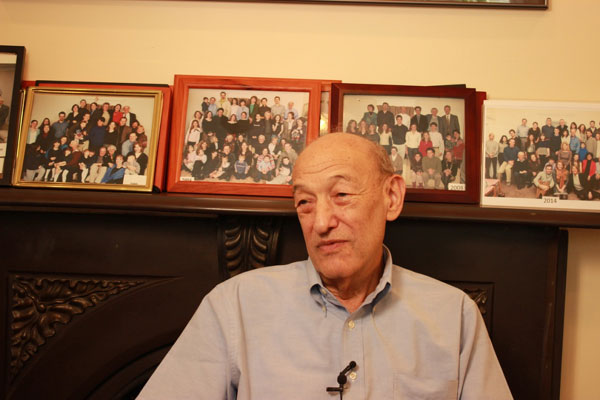

Vogel says momentum in dialogue can best benefit
 |
|
Ezra Vogel, emeritus professor at the Asia Center of Harvard University, said the coming meeting of President Xi and President Obama would boost the mutual trust of the two countries. REN QI/CHINA DAILY |
The coming state visit of President Xi Jinping to the US and his meeting with his US counterpart President Barack Obama will be a milestone and mutual trust will be the biggest issue and may be the largest contribution Xi's visit can make, said Ezra Vogel, a professor emeritus of the Asia Center at Harvard University.
"The boost of mutual trust may be the largest contribution of Xi's visit to Sino-US relation," Vogel said in an interview with Chinese media on Monday. "Xi had some connection and established some friendship with local residents in Iowa during his visit in 1985 and in 2012, and this is the special bridge between Xi and ordinary US people."
Vogel predicted the two leaders would talk about some big concerns, such as Diaoyu Island, the South China Sea, the environment and cybersecurity. "The leaders talked about environmental issues during their last meeting in Beijing, and I think they should carry on the subject," he said.
As America's leading expert on Sino-US relations, Vogel admitted some disagreements existed between the two countries, among them cyber hacking accusations and the South China Sea. He said it would be difficult for the two countries to reach agreement over these sensitive issues in such a short visit, so boosting mutual trust could be "the most important and most basic way" to make progress.
Vogel said the two countries should not only build up mutual trust over issues of mutual concern, such as military mutual trust mechanisms, climate change and cyber security, but also strengthen the exchange of opinions between China and the US Congress, and encourage US Congressmen to learn more about China.
He said the US government should have a more open attitude towards cooperation. "I think China may correct direction over some international cooperation issues, for instance, China's initiative of One Belt One Road and the establishment of the Asia Infrastructure Investment Bank," he said. "The US government should take part in them, rather than contradicting, as the proposal could benefit US itself."
Susan Rice, the US National Security Advisor, visited Beijing in August and met with President Xi and other government officials. Rice showed a positive attitude during the visit, and expressed the wish to boost bilateral relations and enlarge cooperation.
Vogel said Rice's visit could be seen as a preparation for Xi's state visit in September. Vogel, 85, pointed out that as the representative of Obama, Rice's trip showed that Xi's visit meant a lot to Sino-US relations.
Vogel, author of Deng Xiaoping and the Transformation of China, noted that he disagrees with some US scholars who said Xi has changed the rules of game in China. He said the basic policies of China have not been changed, as security and military development remain to be part of the policies.
But what's new is Xi's policy of anti-corruption. "Xi has made a great contribution to China's ongoing anti-corruption campaign, and has received the full support of ordinary Chinese people," Vogel said.
Vogel was glad to see that despite existing disputes between China and the US, Xi had maintained good relations with Obama, which is good for bilateral relations. Still, there can't be a U-turn in China's policy towards the US in such a short time after the visit, he said.
But Vogel predicted that due to the accurate and comprehensive understanding of the current situation that both leaders have, their meeting would bring some surprises to the world.
renqi@chinadaily.com.cn
Related Stories